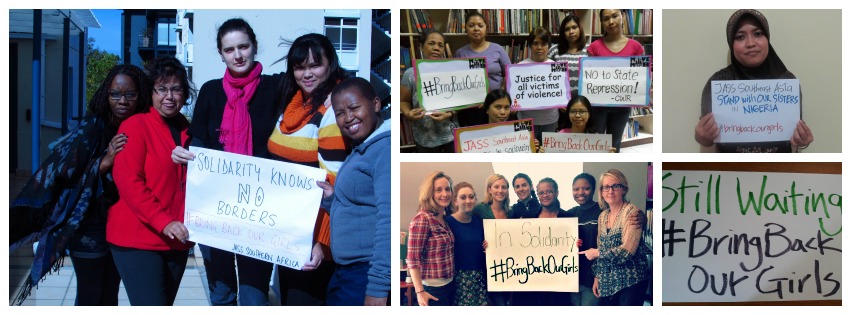When #BringBackOurGirls became the number one trending hashtag on twitter, it became clear that a global call for action was underway. Started by a group of campaigners in Abuja, Nigeria, this hashtag was an urgent call to attract global attention to the kidnapping of over 200 school girls by the armed group Boko Haram in Chibok, Nigeria on April 14th.
This social media campaign has heighted awareness around the 234 Nigerian girls that were kidnapped from Nigeria’s northernmost state of Borno by the al Qaeda-linked group Boko Haram on April 14th. The group, whose name translates to “Western education is sinful,” has terrorized the country for the over four years, targeting schools and other public areas, in an effort to return the country to the pre-colonial days of Muslim rule. The Boko Haram has released statements claiming to be selling the captured girls into sex slavery and forcing girls to marry Boko Haram soldiers.
Women and student led protests erupted across Nigeria calling on the government to respond to these human rights violations and make an effort to return the girls safely home.The mothers, fathers, families, and neighbors of the kidnapped girls have led numerous responses to the government’s inaction to find and rescue their daughters, sisters, and friends. Even as new reports signal the possible kidnapping of another group of girls in Nigeria weeks after the Borno state kidnapping, the government continues to respond with mere rhetoric and shockingly slow action. This tragedy comes days before Nigeria was set to host a meeting of the World Economic Forum on Africa, where hundreds of troops are deployed for the safety of the delegates. Despite this blatant denial of justice, the families continue to push forward, staging numerous protests in the capital and around the country.
Youth and families of Borno warned, “Students will be brought across the nation if no success is recorded before the 40th day of the abduction, to sit tight on Ramat Square to protest until the schoolgirls are freed.” The protests will be held in Maiduguri, the capital of Borno.
Gaining Momentum
The hashtag #BringBackOurGirls is circulating globally, as well as the hashtag created previously in response to sexual slavery #RealMenDontBuyGirls. Mainstream media, previously silent on the issue, has been forced to pick up the story as #BringBackOurGirls hashtag went viral, having been tweeted over a million times in the last two weeks. Following the international outcry for action and weeks after the kidnapping, Nigerian lawmakers are finally calling on the international community for support in the rescue and safe return of the missing girls.
The UN Office of the High Commissioner has made public statements, the US State Department has agreed to send non-military support, France has pledged to “do anything they can” to aid the efforts, and thousands of citizen protests and vigils have been organized to draw attention to this human rights violation.
Friday, May 09, 2014, hundreds of people, including Nigerians in England, will gather in front of the Nigerian high commission in London to protest the abduction of the girls.
In Washington, DC JASS, Amnesty International, Africa Faith & Justice Network, Institute of Policy Studies, Voices of Women and Children, and Howard University will host a rally and vigil to show solidarity with the hundreds of families who are seeking justice and the thousands of Nigerians who are demanding that their government protect their citizens’ human rights, especially the rights of women and girls.
Though normally invisible, this devastating moment has brought an international spotlight on how girls and women are deeply impacted by terrorism, fragile democracies, and human rights issues. The slow and at times non-existent response from the government has shown the deeply entrenched discrimination that continues to penetrate Nigerian political culture and signifies why women and girls must always be a critical part of foreign political agendas.
How are you showing your support and solidarity?


























